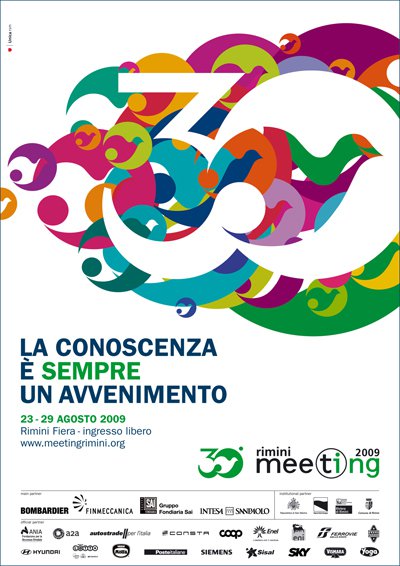
2009 Edition

Knowledge is always an event
“Knowledge is always an Event”: this is the theme that will title the 30th edition of the Meeting for friendship among peoples. We have absolutely no intention to propose an inaccessible discussion for the non-experts. First of all we will discuss mankind and how he relates with the world.
In this general climate of worrying uncertainties and suspicion for the future we feel the urgency to concentrate on the dynamics through which mankind acquaints with the truth. This is the main issue of the debate.
In order to do this it is necessary to understand whether knowledge can be simplified to an arbitrary interpretation and to the “building up” of the subject, if it must be understood exclusively in the sense of an alleged “objectivity” of scientific knowledge, or rather if it is “a meeting point between a human energy and a presence.” It is, therefore, always an event that occurs in ways and forms different between themselves and constitutively implies an element of otherness.
Alain Finkielkraut affirms, “An event is something that breaks-in from the exterior. It is something unexpected. This is the supreme method of knowledge. We must give back to the event its ontological dimension of a new beginning. It is an irruption of the new that breaks the mechanisms and triggers a process.”
At the basis of every course of knowledge, also and especially scientific discovery, it is the stumbling over something new which had not become part of the experience or simply had not been even considered. That is why knowledge is always in movement and hence, always perfectible.
The “new” that bursts in and triggers or re-launches the dynamics of knowledge is not only something, but necessarily is someone: it is what we call a witness. Without the mediation of witnesses there would not be the growth of knowledge, there would not be civilization and culture, and there would not be history. More radically, it is the testimony of the other, when it comes to different humanity, that fully corresponds to the constituent expectations of mankind which makes it clear and “intelligible” the sense of living.
Reason and love are profoundly united in the dynamics of knowledge since reason without love, without a sincere support to reality, cannot be known. As Jean-Luc Marion affirms, “love is a central part of rationality,” and, therefore, of knowledge.
The events at the Meeting will be the occasion to meet witnesses for which life continues to be an adventure of an always new knowledge, because it is an event.



